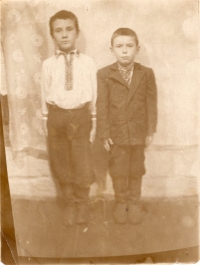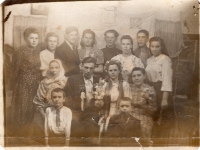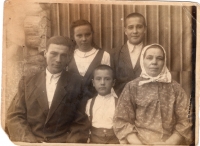"And the older brother - Zakharkiv, Zakharkiv Vasyl, studied at the gymnasium in Zolochiv. Well, at that time, it was clear that our family couldn't give him this kind of education, everything was... And those brothers from America helped. And, well, brother, he finished this, the gymnasium, and I don't know all the data when he, well, joined the UPA. And in 1945, when there were already Muscovites, and there was a hiding place in our yard, where somewhere in January in the garrison, which was almost like... They were walking... Near the... I forgot... It was near the church, and people say it was broken ground. There are ditches and forests, and there was a very strong insurgent movement. More than forty young men from our village were killed in that insurgent movement alone. And they surrounded the house quickly, maybe they were acting on a tip-off, it's unknown why it happened. And it was winter, and everyone from our house, everyone escaped, and only my mother remained, I was then... well, even... I was in[19]44… I was lying in the cradle, and there also was a nephew, he was of the same age as me because my older sister was already married. And I was born very late because my father was taken by the Germans to work as an ostarbeiter in Germany. And my father worked in Germany somewhere in Austria for more than 2 years. And after that, after my father, after he returned from Austria, then I was born in [19]44. And then they started looking for a hiding place, well, no one, everyone was afraid in the village, they were surrounded, no one came to the neighbors. And they, in fact, they found a way out of hiding, which was... Well, it was further on the territory. And they began from there, they were afraid to go there, and they began to collect straw that was in the barn and to throw it there and set fire to hay there, to make them come out. There were four boys, and so... It continued for four days, and they couldn't do anythin', and later they started because there was a school near the church, as always there was a school, and there was a well, and they carried water from that well and wanted to pour it or something like that. The fact is, the fact is, they forced, well, they forced my mother to crawl inside the hiding through the hatch. When my mother went down there for the first time, those guys were still alive. And they asked if they could, she said, if they could escape. And my mother says that it is impossible because there is a garrison around. And then, when she came out, they asked her, she said there was no one in there. At that time, they still did not believe. The fact is that during these days, they constantly, well, burned all the straw and hay, smoking them out from there. My mother, she was driven there three times, and during the third time, when they came there, she said that there was no one inside, as of that moment the guys already shot themselves. They already... She said that Vasyl was sitting like that against the wall with a pistol, he had a small pistol and already… Well, one was left, one was left, and he actually survived, he came out. His father was the head of the village council during the first, as people say, during the first Soviet occupation, and the Germans took him away, and he disappeared. And so he had reasons, I do not know how, no one knows what happened there, how it happened there. And he, in fact, survived. After the war, he was the principal of a school somewhere in Radekhiv district, but his mother lived in the village, but he never came to the village, and I never saw him, and I, in fact, don't know him. Because after that, when they wanted, when those guys there... They were shooting, and my mother was beaten later because she said there was no one there. And she was beaten so hard, she was even given communion, they thought she wouldn't live. And one of their commanders said my mother had to be shot, they took her out of the house and... But one of them, I don't know, he wanted, he said, ´I can't sin against the God by making these two kids orphans.´ And, and my mother survived.



